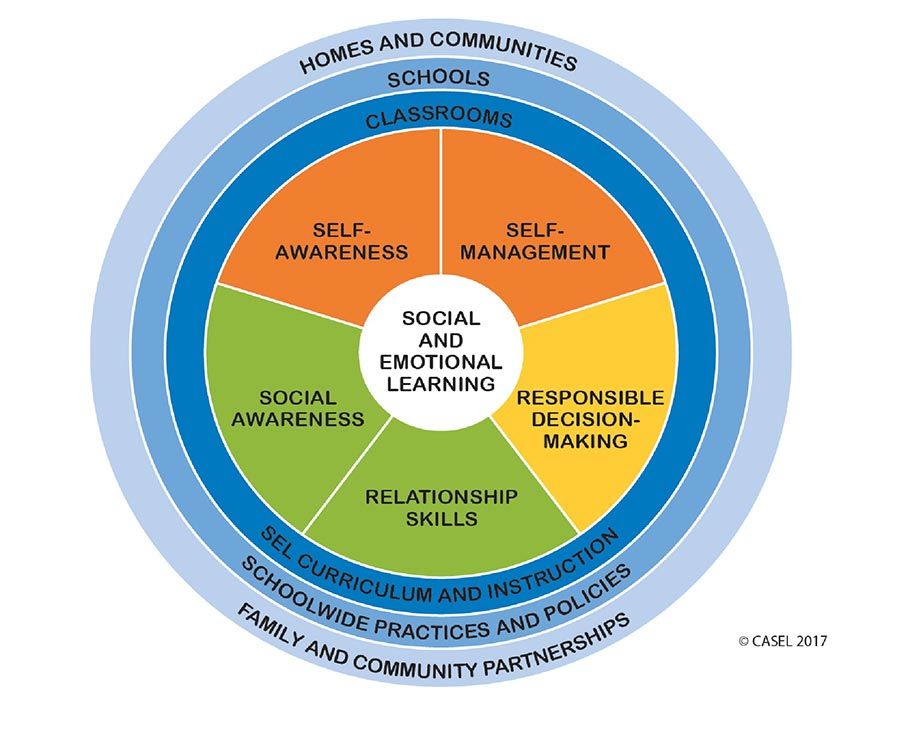Social Emotional Learning Competencies
Introduction

Social and emotional learning (SEL) enhances students’ capacity to integrate skills, attitudes, and behaviors to deal effectively and ethically with daily tasks and challenges(1). The Arizona Department of Education (ADE) recognizes the value and importance of supporting students’ academic, social and emotional learning, as well as the SEL of educators and communities. The Arizona Department of Education believes that social and emotional learning will positively affect all students as empowered problem solvers equipped with the agency to be successful in the cognitive, social, and emotional aspects of life.
The Arizona Social Wellness Committee and external partners believe that the CASEL definition of transformative SEL should be a common definition in the larger state system of K-12 education. We believe that social and emotional learning is a process whereby students and teachers build strong, lasting, and respectful relationships founded on:
- the application of similarities and differences,
- the examination of the root causes of inequity,
- and the development of collaborative solutions to community and social problems(2).
ADE Arts Education recognizes the inherent connection between the Arizona SEL Competencies and the Arizona Arts Education Standards and Artistic Processes.
Equity Elaborations
Culture and equity are important in the process and approaches for SEL. In addition, with the growing focus on trauma-informed practices and behavioral health supports, SEL can help create caring, just, inclusive, and healthy communities that support all learners in reaching their fullest potential.(3) As educators, it is our responsibility to navigate the varied and complex causes of educational inequity and work to close these gaps. We must ensure that all students receive the supports they need to achieve in academics and life and are treated equitably under discipline policies. SEL can help us achieve these goals.(4)
The 5 SEL Competencies can be elaborated on to demonstrate the natural integration of equity as a key outcome to the inclusion of social and emotional learning with the adults, students and school community within a learning system.
The five competencies can be grouped by the following equity areas of focus.(5)
- Identity aligns with self-awareness.
- Agency and Efficacy align with self-management and relationship skills.
- Belonging and Engagement align with social awareness and responsible decision making.
This same practice is applicable to the Artistic Processes with the five competencies appearing in the 4 Artistic Processes of CREATE, PERFORM/PRESENT/PRODUCE, RESPOND, and CONNECT.
Arizona Arts Education recognizes the value of equitable and inclusive arts learning through an intentional emphasis on culturally responsive practice in arts education.(6) Educational equity means that all students have access to the same resources and educational rigor despite race, gender, ethnicity, language, disability, family background or family income.(7) By extending the definition of SEL and Arts Education to focus on the natural connections to equity, the definition of Arts & SEL becomes transformed. "Transformative SEL is a process whereby students and teachers build strong, respectful relationships founded on an appreciation of similarities and differences; learn to critically examine root causes of inequity; and develop collaborative solutions to community and social problems.(8)
For more information, on the Arizona SEL Competencies and Equity Elaborations, please refer to the reference guide.
1 (CASEL, 2020). 2 (CASEL, 2020). 3 (IDOE, 2019). 4 (NYSED, 2018). 5 (CASEL, 2020). 6 (ADE, 2019). 7 (Council of Chief State School Officers, 2017). 8 (Council of Chief State School Officers, 2017)


